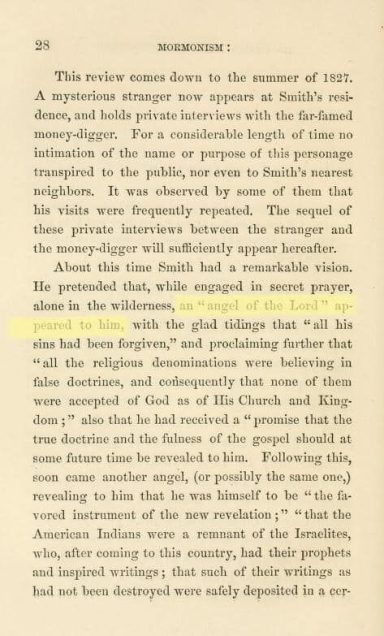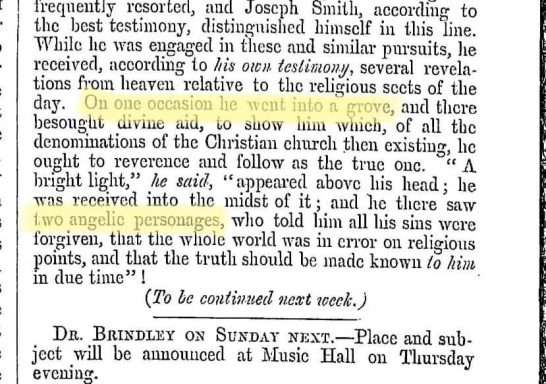Alleged Persecution
"I soon found, however, that my telling the story had excited a great deal of prejudice against me among professors of religion, and was the cause of great persecution, which continued to increase..."
-Joseph Smith
Was Joseph Smith persecuted for his vision?
Claim
In Volume 1 of the History of the Church, Joseph himself says that, “I soon found, however, that my telling the story had excited a great deal of prejudice against me among professors of religion, and was the cause of great persecution, which continued to increase; and though I was an obscure boy… yet men of high standing would take notice sufficient to excite the public mind against me, and create a bitter persecution; and this was coming among all the sects -all united to persecute me” [p. 7].
Reverend Wesley Walters later discovered journals of these professors of religion and none of them even mention Joseph’s name, let alone his heavenly vision (although they do report that no revivals happened in 1820).
Joseph goes on to say that he suffered “the most bitter persecution” [p. 7] and that “while they were persecuting me, reviling me, and speaking all manner of evil against me falsely, for so saying, I was lead to say in my heart, Why persecute me for telling the truth?” [p. 8]
“I continued to pursue my common vocation in life (among which would have included treasure digging with his stone in a hat) until the 21st of Sept, 1823,” and then he asserts that he was “all the time suffering severe persecution at the hands of all classes of men, both religious and irreligious, because I continued to affirm that I had seen a vision” [p. 9].
He even goes on to dramatically say that he was “persecuted by those who ought to have been my friends” [p. 9].
Joseph transitions to say that “While I was yet employed in the service of Mr. Stoal (mainly in treasure digging) owing to my continuing to assert that I had seen a vision, persecution still followed me..” [p. 9] He was, during his employment with Stoal, put on trial for being a "glass looker" in May of 1826, but even so Joseph does not link any persecution to treasure digging, only to his professing to see the Lord.
On the following page he says that he was again persecuted, but this time it was because of his reportedly finding buried treasure in the form of gold plates. And again, he asserts that this persecution came from his reporting to have seen God, not at all on the fact that he had been -all these many years -digging for buried treasure.
Evidence
I have specifically been combing through the historical records to see if such persecution existed. Such existing evidence, of course, can only be in the form of the written and printed word.
In all of the newspapers and anti-Mormon literature published in the 1800s, very few even mention the first vision, and fewer still actually persecuted him for it. In fact, the EARLIEST reference to his first vision that I could find by those that would persecute him doesn’t appear until 1851 by Reverend Ashley, who seems far from persecuting him for said vision. The next of my findings appears in 1857 in the newspaper edited by John Brindley. Again, I can’t read the persecution in his article. The last of my findings comes from Pomeroy Tucker in 1867, who merely says that Joseph was visited by “an angel of the Lord” who told him all denominations were incorrect. While Tucker had often been seen as anti and unreliable, historians today are giving him more and more credit as his accusations are proving more and more true (notably Joseph Smith’s higher education).
Conclusion
Whether or not he had the vision at all, to me it seems very evident, from the newspapers, the many printed exposés on the young prophet, and from the journals of the religious leaders of his day, that Joseph Smith received no persecution from his first vision at all. Of course it is possible that he only received persecution verbally and although (as Joseph claims himself) it was from professors of religion and at came at him time and time again, yet it wasn't enough for the newspapers to take notice, or really anyone else for that matter.
Anti-Mormon Literature in the 1800s
The following is not a comprehensive list of anti-mormon literature of the 1800s, but should give a good example of what was and was not being published in regards to the First Vision. If there are pieces of literature that I have not included, that you would like to see below, please email me at julia@analyzingmormonism.com
"The Golden Bible" published in The Palmyra Freeman, Aug. 27, 1829 - No mention of the First Vision
"Blasphemy: Book of Mormon alias The Golden Bible" published in The Rochester Republican, April 6, 1830 - No mention of the First Vision
"New Bible" published in The Fredonia Censor, June 2, 1830 - No mention of the First Vision
The Buffalo Journal & General Advertiser, Dec. 8, 1830 - No mention of the First Vision
"Book of Mormon" published in The Gem, Dec. 25, 1830 - No mention of the First Vision
"The Book of Mormon" published in The Rochester Republican, Dec. 28, 1830 - No mention of the First Vision
The Buffalo Patriot (article taken from The Ontario Messenger), Dec. 28, 1830 - No mention of the First Vision
The Brockport Free Press, Dec. 29, 1830 - No mention of the First Vision
"Book of Mormon" published in The Brockport Free Press, Jan. 5, 1830 - No mention of the First Vision
Lockport Balance, May 31, 1831 - No mention of the First Vision
"Progress of Mormonism" published in the Jamestown Journal, June 29, 1831 - They published Martin Harris' claim to have seen Jesus and even the Devil, but they don't publish Joseph's claim as well?
"Mormonism" published in the Buffalo Patriot, Sept. 6, 1831 - No mention of the First Vision
Daily Albany, Oct. 15, 1831 - No mention of the First Vision
"The Mormon Delusion" published in the Jamestown Journal, Dec. 7, 1831 - No mention of the First Vision
"Mormonism" published in the Fredonia Censor, March 7, 1832 - No mention of the First Vision (the article reads: "having repented of his sins, but not attached himself to any party of Christians, owing to the numerous divisions among them, and being in doubt what his duty was, he had recourse prayer. After retiring to bed one night, he was visited by an Angel and directed to proceed to a hill..." The vision is totally absent.)
The Kingdom and Gospel of Jesus Christ by Peter Bauder, 1834 - Not only is there no mention of a First Vision, Bauder also states that Joseph "could give me no Christian experience."
Mormonism Unveiled by E. D. Howe, 1834 - No mention of the First Vision
Mormonism Exposed Internally and Externally by Origen Bacheler, 1838 - No mention of the First Vision
An Antidote to Mormonism... by James M’Chesney, 1838 - Unknown
An Exposure on Mormonism... by Richard Livesey, 1840 - Unknown
Mormonism Exposed... by La Roy Sunderland, 1842 - No mention of the First Vision
The History of the Saints: An Expose of Joe Smith and Mormonism by John C. Bennett, 1842 - No mention of the First Vision
Fruits of Mormonism by Nelson Slater, 1851 - No mention of the First Vision
Mormonism: An Exposure of the Impositions... by Francis Busteed Ashley, 1851 - No mention of the First Vision
*Mormonism Exploded ... by Andrew Belfour Hepburn, 1855 - Hepburn references the First Vision
The Prophets or Mormonism Unveiled by Orvilla S. Belisle, 1855 - No mention of the First Vision
*The Antidote to Mormonism and Infidel Error by John Brindley, 1857 - Brindley references a visit from angelic personages
Exposure of Clerical Slander by J. Habe, 1864 - No mention of the First Vision
*Origin, Progress, and Rise of Mormonism... by Pomeroy Tucker, 1867 - Tucker says that "an angel of the Lord" told Joseph not to join the other churches and that it was mostly likely Moroni
The Mysteries of Mormonism... by Alfred Trumble, 1881 - No mention of the First Vision
The Mormon Iniquity... by Frederick Alphonso Noble, 1884 - No mention of the First Vision
New Light on Mormonism by Ellen E. Dickinson, 1885 - No mention of the First Vision
The Mormons by Edward O. Guerrant, 1890 - No mention of the First Vision
Fruits of Mormonism by Franklin Stewart Harris, PhD and Newbern Isaac Butt, BS, 1925 - No mention of the First Vision

“Our whole strength rests on the validity of that [First] vision. It either occurred or it did not occur. If it did not, then this work is a fraud. If it did, then it is the most important and wonderful work under the heavens. I knew a so-called intellectual who said the Church was trapped by its own history. My response was that without that history we have nothing. The truth of that unique, singular, and remarkable event [The First Vision] is the pivotal substance of our faith.”
- Prophet Gordon B. Hinckley, General Conference, October 2002
© Copyright. All rights reserved.
We need your consent to load the translations
We use a third-party service to translate the website content that may collect data about your activity. Please review the details in the privacy policy and accept the service to view the translations.





